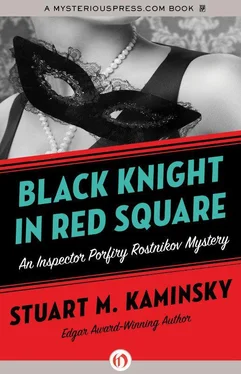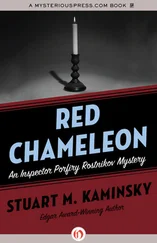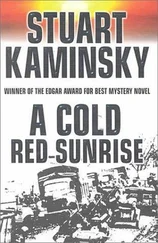Stuart Kaminsky - Black Knight in Red Square
Здесь есть возможность читать онлайн «Stuart Kaminsky - Black Knight in Red Square» весь текст электронной книги совершенно бесплатно (целиком полную версию без сокращений). В некоторых случаях можно слушать аудио, скачать через торрент в формате fb2 и присутствует краткое содержание. Год выпуска: 1983, ISBN: 1983, Издательство: Fawcett, Жанр: Полицейский детектив, на английском языке. Описание произведения, (предисловие) а так же отзывы посетителей доступны на портале библиотеки ЛибКат.
- Название:Black Knight in Red Square
- Автор:
- Издательство:Fawcett
- Жанр:
- Год:1983
- ISBN:9780804104050
- Рейтинг книги:5 / 5. Голосов: 1
-
Избранное:Добавить в избранное
- Отзывы:
-
Ваша оценка:
- 100
- 1
- 2
- 3
- 4
- 5
Black Knight in Red Square: краткое содержание, описание и аннотация
Предлагаем к чтению аннотацию, описание, краткое содержание или предисловие (зависит от того, что написал сам автор книги «Black Knight in Red Square»). Если вы не нашли необходимую информацию о книге — напишите в комментариях, мы постараемся отыскать её.
Black Knight in Red Square — читать онлайн бесплатно полную книгу (весь текст) целиком
Ниже представлен текст книги, разбитый по страницам. Система сохранения места последней прочитанной страницы, позволяет с удобством читать онлайн бесплатно книгу «Black Knight in Red Square», без необходимости каждый раз заново искать на чём Вы остановились. Поставьте закладку, и сможете в любой момент перейти на страницу, на которой закончили чтение.
Интервал:
Закладка:
Behind him he could hear a movement, slight but distinct. He assumed that one of the guards had a microphone or some other device with which he could summon help. Karpo hoped this was true, for he could not stand there for more than a few minutes without attracting attention, especially if the Germans moved away and no other group moved close.
He turned again, glancing along the wall and beyond the marble stands at the foot of the Kremlin tower to the Nikolsky tower and the gate below. Two men in uniform were moving forward quickly, hands on their flapping holsters. Karpo sauntered in their direction through the group of Germans, still trying to look like a tourist, but knowing that he would fool no one.
He intercepted the two men about a hundred yards to the right of the mausoleum and kept his hands in front of him and clearly visible.
“Major,” he said, stepping in front of them.
The major, a hard-faced man of about forty-five with jaw clenched, flipped open his holster as the officer behind him took two steps to one side and did the same.
“If you will be as inconspicuous as possible,” Karpo said, noting that a few people were looking their way, “you can remove my identification from my right coat pocket. May I warn you that someone may be watching us? If we do not act with speed and caution, we may be too late.”
The major nodded toward the other officer, a young lieutenant, who advanced on Karpo, one hand still on his open holster. Reaching into the policeman’s pocket, he removed the wallet and handed it to the major, who opened it, examined it, and looked at Karpo.
“Lieutenant Aronsov will remain with you while I check on your credentials,” the major said softly.
“There may not be time,” Karpo said, looking at the tower clock which now showed fifteen minutes to eight.
“Damn you,” hissed the major. “Why didn’t you go through proper channels with this?”
“There was no time,” Karpo replied evenly. “I wasn’t sure until a short while ago.” He did not add that he was not certain even now.
The major’s hands drummed against the leather of his holster as he appraised Karpo. Evidently he was properly impressed.
“Come,” he said. He walked past Karpo and the lieutenant and headed directly for the mausoleum. Karpo turned and followed with the lieutenant behind, watching him.
“No one can enter the mausoleum carrying anything,” the major said, “not a briefcase, flight bag, camera, anything.”
“The detonator would be quite small,” said Karpo.
The major grunted, pushed aside a startled Asian tourist and strode to the bronze door.
“With a dozen men we could do this in one minute,” the major said impatiently, “but I suppose…”
“It would be rather conspicuous,” finished Karpo, “and the terrorist might simply decide to detonate if she is watching. She might do so anyway.”
“She,” grunted the major, waiting for the guard to open the bronze door.
“Yes,” said Karpo.
They entered and picked up an echo in the near darkness.
“And what we have already done might be sufficient to set her off,” the major observed, nodding at the lieutenant to move. The major did not take his eyes off Karpo. The lieutenant moved swiftly, clearly knowing every inch of the interior, every place a bomb could conceivably be placed. Karpo watched, wanting to help and knowing that he would not be allowed to. The slight hum of the air conditioning played above the rapid movements of the lieutenant as they moved down the stone staircase. The light around the sealed case was dim, but the young officer’s hands were swift. Karpo watched with fascination as the young man moved behind the glass-covered face of the corpse of Lenin.
“Here,” cried the lieutenant, emerging from the far side of the casket holding up the small black box. “Plastic on the outside held it in place. No way to judge how powerful it is.”
“One of her bombs went off a few hours ago at the Zaryadye Cinema,” said Karpo.
“That was a bomb?” asked the major. “We heard…”
Karpo nodded.
“Out with it,” the major said, and the lieutenant moved swiftly to the stairs.
“I suggest you put that in your pocket,” Karpo said, hearing his voice echo back. “If she is out here and…”
The young man looked at the major who shrugged and said, “The important thing is to get out of here with it. Let’s go.”
“I’ll take it,” said Karpo, moving forward as the lieutenant passed him. He grabbed the small box and heard both men respond almost immediately with drawn guns.
“If I were the one, I wouldn’t have waited till I was in here,” he said.
“What do you-” began the major, holding his pistol aimed at Karpo’s chest. “Forget it. We’ll deal with this outside. Move.” He motioned with his gun as Karpo plunged the box into his pocket and moved quickly up the stairs through the cool tomb.
Beyond the bronze doors, the sun nearly blinded them. Karpo had been ready for this, and he dashed forward into a crowd of sailors and began to run across the square. He was heading toward an open area not far from the Lobnoye Mesto, the Place of Execution, the Skull Platform of white stone more than four centuries old where the czar’s edicts had been proclaimed and public executions carried out.
There was no place to dispose of the bomb. Whichever way he turned he would be heading toward a national monument. The major and the lieutenant would have followed whatever procedure had been established for bomb disposal. It would have been impossible to impress the urgency on them, because they did not have his understanding of the woman.
Knowing the sailors were behind him, he ran on, pushing through the crowds and dashing across the open spaces, trying to figure out the least damaging place to put the bomb in case she was nearby. And then luck intervened. Standing in front of him, perhaps fifty yards away in front of the Place of Execution was a blond tourist in a blue suit. She was carrying a camera and wearing dark glasses. Karpo headed toward her and glanced up at the Spassky clock, which showed that it was only a few minutes to eight.
At first the woman ignored him, but when it became clear that he was coming directly at her, she turned to face him. Behind her a young couple examined the Place of Execution.
When he was no more than twenty yards from her, the woman removed her dark glasses and fixed him with a look of black hatred.
“Stop,” she commanded, and Karpo stopped. Behind him the soldiers brushed people aside and moved toward him.
Karpo turned his head in the direction of the running boots and saw the lieutenant in advance of the major and another armed soldier.
“That is the woman,” Karpo shouted back to the young man who, panting, looked beyond him and stopped.
The lieutenant glanced at the woman and then at Karpo and saw the same look on both faces that he would never be able to describe adequately, though at the inquiry that night he would make an attempt at it. But whatever it was he saw convinced him, and he turned, still panting, and intercepted the major and the soldier with the rifle.
Karpo turned back to the woman, who held her camera in front of her. He hoped that the soldiers would back away, keep their distance, and clear the area.
“I said stop,” said the woman, in almost unaccented Russian, but Karpo did not stop. “Do you know what this is?” She held up the camera.
In response, Karpo took another step toward her. He was now no more man a dozen paces away, surely well within the destructive range of the small device he now removed from his pocket and held in front of him.
“You’ve failed,” he said.
“I’ll try again,” she said, her eyes looking beyond Karpo at the soldiers. “If you don’t want me to press this button, you will give me assurance that the soldiers will remain where they are until I am gone.”
Читать дальшеИнтервал:
Закладка:
Похожие книги на «Black Knight in Red Square»
Представляем Вашему вниманию похожие книги на «Black Knight in Red Square» списком для выбора. Мы отобрали схожую по названию и смыслу литературу в надежде предоставить читателям больше вариантов отыскать новые, интересные, ещё непрочитанные произведения.
Обсуждение, отзывы о книге «Black Knight in Red Square» и просто собственные мнения читателей. Оставьте ваши комментарии, напишите, что Вы думаете о произведении, его смысле или главных героях. Укажите что конкретно понравилось, а что нет, и почему Вы так считаете.












